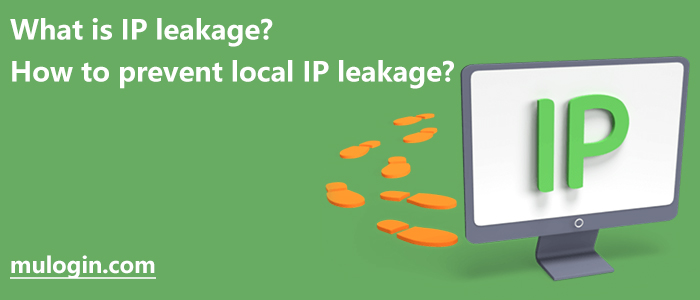MuLogin Browser
Registered
- Joined
- Oct 18, 2022
- Messages
- 14
- Reaction score
- 1
- Points
- 8

IP leakage refers to when the IP address (Internet Protocol Address) of your network connection is unintentionally or intentionally disclosed or leaked to other people or organizations. An IP address is a unique numeric identifier used to identify and locate network devices. When an IP address is compromised, others can use this address to track and identify your location, access your personal information, or attack your network system.
IP leakage can occur in a variety of situations, including:
1. Internet Activity: When you use an Internet service, your IP address may be logged by the website, application or service. If these records are not properly secured, others may be able to access them and obtain your IP address.
2. Insecure network connections: When using unsecured public Wi-Fi networks, hackers may be able to obtain your IP address through network eavesdropping or spoofing.
3. Malware: Certain malware may obtain your IP address by infecting your device and sending it to an attacker.
4. Social media and online platforms: When using social media or other online platforms, if you post your IP address in public, others can see it.
IP disclosure can lead to security risks such as privacy concerns, cyberattacks, and identity theft. To protect your privacy and online security, the following steps are recommended:
– Use a secure Internet connection and avoid unsecured public Wi-Fi networks.
– Update and maintain the anti-virus software and firewall on your device.
– Be careful not to publicize or share your IP address.
– Use tools such as V.P.N (Virtual Private Network) to hide and protect your IP address.
– Regularly check your network devices and applications to make sure they are up-to-date with the latest security versions.
– Be vigilant and avoid clicking on suspicious links or downloading files from untrustworthy sources.
If you find that your IP address has been compromised, it is recommended that you take immediate and appropriate measures to protect your network and privacy security.
To prevent IP leakage, you can take the following measures:
1. Use an Anti-Association Browser More secure than a V.P.N, an Anti-Association Browser provides greater anonymity. Every anti-fraud system works under the digital fingerprint of each user.
2. Avoid using unsecured public Wi-Fi networks: Public Wi-Fi networks are often insecure and hackers can obtain your IP address through network listening or spoofing. It’s best to avoid using these networks or protect them through a V.P.N when using them.
3. Update and maintain the security of your devices: Regularly update and maintain your operating system, applications and anti-virus software. These updates usually contain patches to fix security vulnerabilities and prevent hackers from exploiting these vulnerabilities to gain access to your IP address.
4. Handle personal information with care: Avoid publicizing or sharing your IP address on social media or other online platforms. Also, handle personal information carefully and only provide necessary information on trusted websites and services.
5. Do not click on suspicious links or download files from untrustworthy sources: Clicking on malicious links or downloading files carrying malware may cause your device to become infected, revealing your IP address. Be vigilant and only click on links and download files from trusted sources.
6. Use a firewall: Configuring and enabling a firewall can help block unauthorized access, secure your network, and reduce the risk of IP leakage.
7. Increase online privacy settings: Limit public visibility of your personal information on websites and services where possible, and set appropriate privacy options to restrict who can access your IP address and other personal information.
By taking these precautions, you can reduce the risk of IP leakage and protect your online privacy and network security.
The optimal solution is to create unique browser fingerprints for each of the multiple accounts. Due to the complexity of switching between different V.P.N channels and the possibility of different IP addresses during the authentication process, using an anti-association browser makes managing multiple accounts easier. The Anti-Association Browser allows you to create multiple browser profiles and set different proxy IPs for each of them, as well as allowing you to choose the type of proxy connection: for example, MuLogin Antidetect Browser supports HTTP, HTTPS, SOCKS4, SOCKS5, IPv6, and self-provisioning proxies. For each account, you can individually set the IP location of the desired country without being associated.
With the increasing popularity of anti-association browsers, choosing a good anti-association browser is especially important to develop your online business, welcome to visit MuLogin’s official website for more details.

